

The Limits of Satire by Tim Parks. What does satire do?
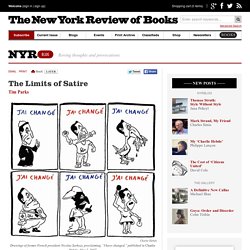
What should we expect of it? Recent events in Paris inevitably prompt these questions. In particular, is the kind of satire that Charlie Hebdo has made its trademark—explicit, sometimes obscene images of religious figures (God the father, Son, and Holy Spirit sodomizing each other; Muhammad with a yellow star in his ass)—essentially different from mainstream satire? Is it crucial to Western culture that we be free to produce such images?
Do they actually work as satire? Neither straight journalism nor disengaged art, satire alludes to recognizable contemporary circumstances in a skewed and comic way so as to draw attention to their absurdity. Since satire has this practical and pragmatic purpose, the criteria for assessing it are fairly simple: if it doesn’t point toward positive change, or encourage people to think in a more enlightened way, it has failed. Why so? This was not, I believe, a question of self-censorship or lack of courage on the magazine’s part. In Solidarity With a Free Press: Some More Blasphemous Cartoons. Defending free speech and free press rights, which typically means defending the right to disseminate the very ideas society finds most repellent, has been one of my principal passions for the last 20 years: previously as a lawyer and now as a journalist.
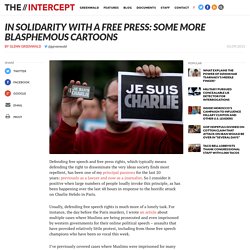
So I consider it positive when large numbers of people loudly invoke this principle, as has been happening over the last 48 hours in response to the horrific attack on Charlie Hebdo in Paris. Usually, defending free speech rights is much more of a lonely task. For instance, the day before the Paris murders, I wrote an article about multiple cases where Muslims are being prosecuted and even imprisoned by western governments for their online political speech – assaults that have provoked relatively little protest, including from those free speech champions who have been so vocal this week. But no matter. Their cartoons were noble and should be celebrated – not just on free speech grounds but for their content. Joe Sacco: On Satire – a response to the Charlie Hebdo attacks. Papa Francisco sobre Charlie Hebdo: Libertad debe ir acompañada de prudencia. ROMA, 19 Ene. 15 / 05:08 pm (ACI/EWTN Noticias).- En la conferencia de prensa a bordo del avión que lo llevó de Filipinas a Roma, el Papa Francisco fue consultado nuevamente sobre Charlie Hebdo y la libertad de expresión, luego de que surgiera alguna polémica por sus declaraciones durante el vuelo de Sri Lanka a Filipinas, el 15 de enero.
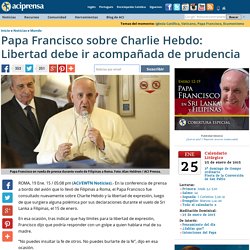
En esa ocasión, tras indicar que hay límites para la libertad de expresión, Francisco dijo que podría responder con un golpe a quien hablara mal de su madre. “No puedes insultar la fe de otros. Varios ataques en Francia contra lugares de culto musulmán tras el atentado contra Charlie Hebdo. Charlie Hebdo founder says slain editor 'dragged' team to their deaths. Delfeil adds: “He shouldn’t have done it, but Charb did it again a year later, in September 2012.”

The accusation sparked a furious reaction from Richard Malka, Charlie Hebdo’s lawyer for the past 22 years, who sent an angry message to Mathieu Pigasse, one of the owners of Nouvel Obs and Le Monde. “Charb has not yet even been buried and Obs finds nothing better to do that to publish a polemical and venomous piece on him. “The other day, the editor of Nouvel Obs, Matthieu Croissandeau, couldn’t shed enough tears to say he would continue the fight.
I didn’t know he meant it this way. I refuse to allow myself to be invaded by bad thoughts, but my disappointment is immense.” Matthieu Croissandeau, Nouvel Obs’ editor, said: "We received this text and after a debate I decided to publish it in an edition on freedom of expression, it would have seemed to me worrisome to have censored his voice, even if it is discordant. ¿Ser o no ser “Charlie Hebdo”? La frontera difusa entre discurso de odio y libertad de expresión. @MarkMatthewsNBC pic.twitter.com/9NJ9PcEtAE— Carlos Latuff (@LatuffCartoons) enero 7, 2015.
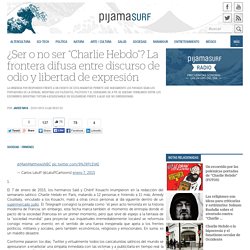
¿Doble estándar? Charlie Hebdo despidió a un caricaturista por columna “antisemita” En una reciente entrevista, el caricaturista brasileño Carlos Latuff ofrece una interesante reflexión sobre el complicado predicamento en el que nos encontramos, defendiendo la libertad de expresión en medio de un acendrado conflicto religioso: Es una discusión perpetua, porque qué es libertad de expresión y qué es expresión cáustica.
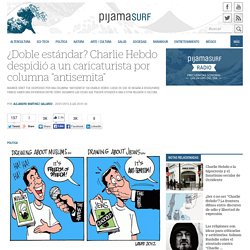
¿Por que algunos sujetos están protegidos por la libertad y otros no? ¿Por que podemos burlarnos de ciertas cosas pero no de otras? ¿Negar el holocausto, por ejemplo, debería de ser incluido como libertad de expresión o agresión racial? Hay que ver, por ejemplo, el tratamiento que se le da en los medios occidentales a las caricaturas de Mahoma y las caricaturas del Holocausto. Negar el Holocausto está prohibido en Francia. Este doble estándar parece también haber existido dentro de Charlie Hebdo. Anteriormente Charlie Hebdo había sido demandado por organizaciones islámicas en Francia por sus caricaturas y se negó a ofrecer una disculpa.